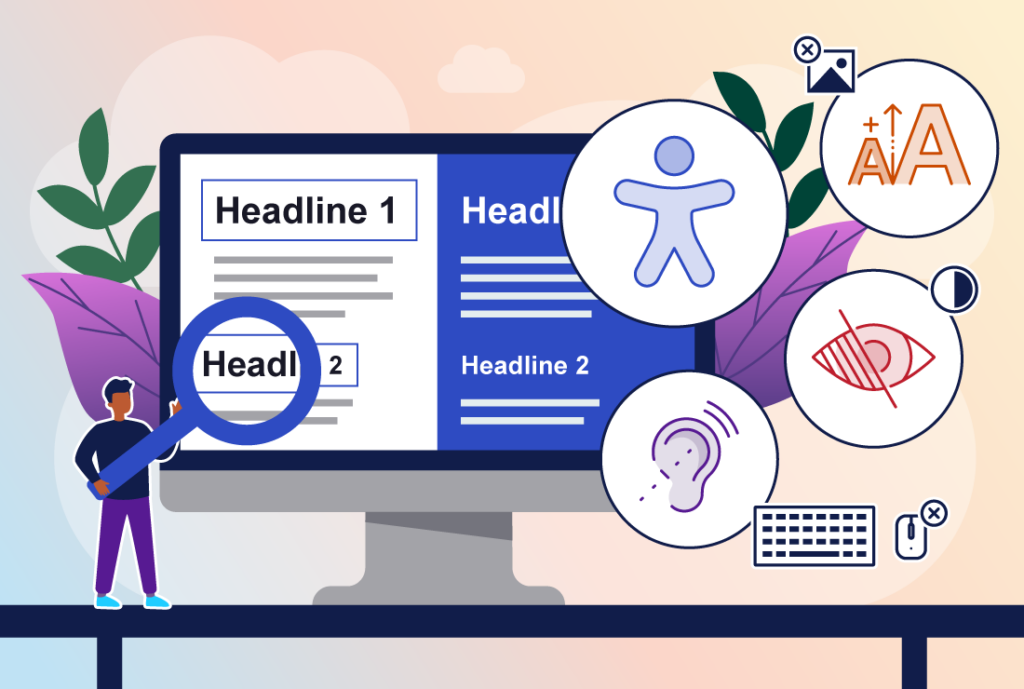
Let’s face it: our lives are linked to the internet. From connecting with others to shopping and banking, it’s hard to imagine a life without online access — most of us interact with it for hours each day.
Not everyone has equal access to the digital world, however. That’s why website accessibility, or designing and developing websites usable by people with disabilities, is critical to ensure inclusivity and equal opportunities for all internet users.
Read on to learn more about what defines website accessibility, its legal and ethical implications, its impact on businesses, and how to offer greater accessibility on your website.
What is website accessibility?
Website accessibility refers to the practice of creating websites that can be used and understood by individuals with disabilities, including those who are blind, deaf, have mobility impairments, or have cognitive disabilities. It involves removing barriers and providing alternatives to ensure all users can access and interact with a website’s content regardless of their abilities.
These guidelines help ensure everyone can see information on a website, navigate it, and understand what is being presented, regardless of ability. Website strategies that align with these principles include:
- Offering text alternatives for non-text content;
- Ensuring keyboard operability so users can navigate content without a mouse;
- Providing clear and consistent navigation;
- Using code that is compatible with assistive technology;
- Including captions for multimedia content;
- Choosing readable and resizable fonts; and
- Maintaining an optimal color contrast so elements are easy to read.
The legal and ethical implications of website accessibility
There are many reasons a business should prioritize website accessibility, including:
- Legal obligations: Accessibility-based lawsuits are on the rise. Paying attention to your website’s accessibility could protect your organization from potential lawsuits, not to mention help avoid costly litigation and reputation damage. Many countries legally recognize the importance of website accessibility. For example, in the United States, the Americans with Disabilities Act (ADA) and Section 508 of the Rehabilitation Act mandate compliance for government agencies and some federally funded programs. The Web Content Accessibility Guidelines (WCAG) also outline four main principles of website accessibility, including requirements that content be perceivable, operable, understandable, and robust.
- Anti-discrimination laws: Beyond specific web accessibility laws, there are broader anti-discrimination laws worldwide that mandate equal access to goods, services, and information, which often extends to websites. In the European Union, the European Accessibility Act enforces web accessibility standards, while in the United Kingdom, the Equality Act of 2010 prohibits discrimination on various grounds, including disability.
- Ethical considerations: Maintaining website accessibility is also a matter of ethical responsibility. Ensuring everyone has the same opportunities to access information, participate in online activities, and use digital services is critical in an inclusive society.
Five ways your company benefits from having an accessible website
In addition to the legal and ethical reasons why today’s businesses should pay attention to website accessibility, there are other added benefits, including:
- Social inclusion: Website accessibility promotes social inclusion, which increases access to the digital world for individuals with disabilities, making it easier to apply for jobs, access information, and engage in online social activities.
- Wider reach: Making your website accessible means it can cater to a broader audience, including people with disabilities. Greater accessibility = broader prospects = greater exposure and revenue potential.
- Improved user experience: Web accessibility features, such as alt text for images, captions for videos, and clear navigation, benefit all users. For instance, alt text assists users with visual impairments but also serves as a helpful description for everyone when an image fails to load.
- Enhanced SEO: These days, search engines like Google and Bing consider accessibility when ranking websites, and those that demonstrate a commitment to accessibility generally rank higher in query results.
- Improved reputation: Demonstrating a commitment to accessibility can enhance your organization’s reputation. Users, including those without disabilities, tend to view accessibility efforts positively, which can translate into increased trust and customer loyalty.
Make your website accessible without a complete redesign
While it could take considerable time to make all the necessary changes by hand to ensure your website is accessible, plenty of third-party services can do the work for you. These come in a few different forms, but all serve a similar function, and it can be as easy as adding a plugin or widget on your website. Once installed, these services provide site visitors with the tools needed to make the website accessible to them, regardless of disability (and many provide a variety of languages as well).
Becoming accessible with AccessiBe
One third-party service that is gaining in popularity is AccessiBe. With a vision to make the internet more accessible, inclusive, and equitable, the company has created solutions that make it easy for businesses to comply with ADA guidelines.
By creating an account and adding a widget to your website, accessiBe can create a unique user experience for every visitor, allowing for modifications based on the user’s needs. The widget’s AI capabilities can even scan your website for content it deems inaccessible and fix these issues via your website’s code.
The widget also runs a scan every 24 hours, so if you add any new content to your site, accessiBe will make sure any updates are compliant and accessible. It’s a paid service, but Accessibe’s service and litigation support can make it a worthwhile investment.
Need help with website compliance?
As the internet has become the most universal and effective tool today, it’s time we think more seriously about digital accessibility and the inclusion of everyone on the internet. Whether it’s for ethical or legal reasons, it should be clear that web accessibility is obligatory for every modern business.
If you’re ready to prioritize accessible access to your website’s content, contact us or call 503-384-2413 today for a no-cost assessment of your current site! We’ll provide the tools, recommendations, and expertise you need to succeed.